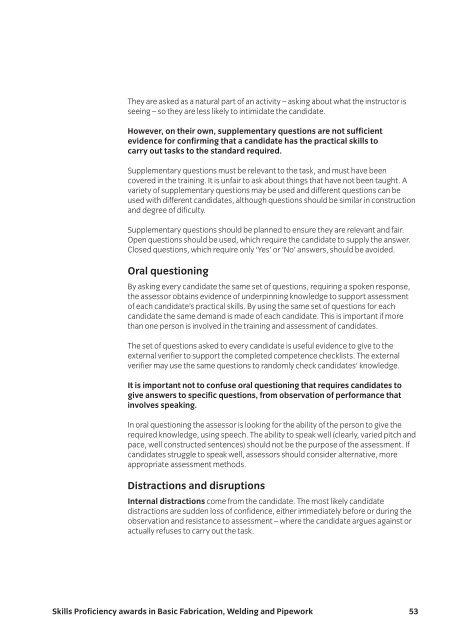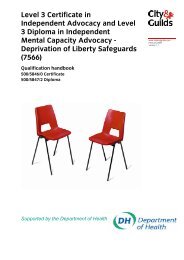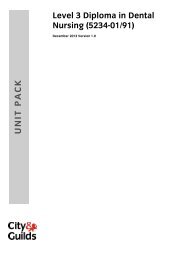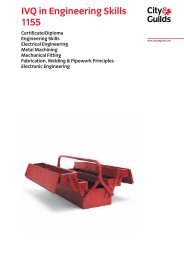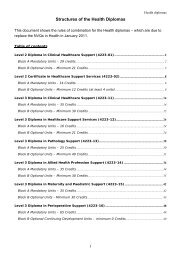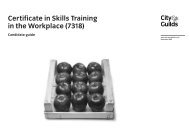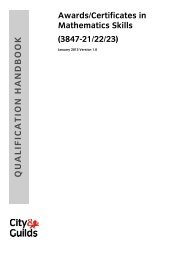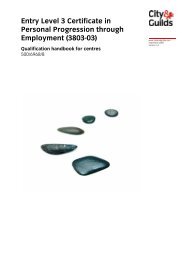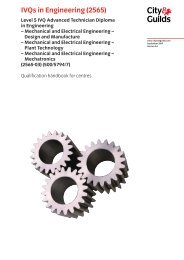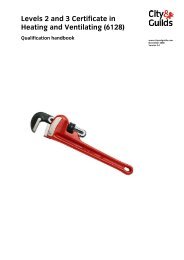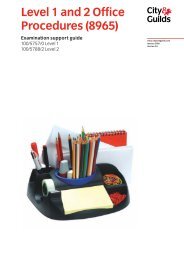Skills Proficiency awards in Basic Fabrication ... - City & Guilds
Skills Proficiency awards in Basic Fabrication ... - City & Guilds
Skills Proficiency awards in Basic Fabrication ... - City & Guilds
You also want an ePaper? Increase the reach of your titles
YUMPU automatically turns print PDFs into web optimized ePapers that Google loves.
They are asked as a natural part of an activity – ask<strong>in</strong>g about what the <strong>in</strong>structor is<br />
see<strong>in</strong>g – so they are less likely to <strong>in</strong>timidate the candidate.<br />
However, on their own, supplementary questions are not sufficient<br />
evidence for confirm<strong>in</strong>g that a candidate has the practical skills to<br />
carry out tasks to the standard required.<br />
Supplementary questions must be relevant to the task, and must have been<br />
covered <strong>in</strong> the tra<strong>in</strong><strong>in</strong>g. It is unfair to ask about th<strong>in</strong>gs that have not been taught. A<br />
variety of supplementary questions may be used and different questions can be<br />
used with different candidates, although questions should be similar <strong>in</strong> construction<br />
and degree of dificulty.<br />
Supplementary questions should be planned to ensure they are relevant and fair.<br />
Open questions should be used, which require the candidate to supply the answer.<br />
Closed questions, which require only ‘Yes’ or ‘No’ answers, should be avoided.<br />
Oral question<strong>in</strong>g<br />
By ask<strong>in</strong>g every candidate the same set of questions, requir<strong>in</strong>g a spoken response,<br />
the assessor obta<strong>in</strong>s evidence of underp<strong>in</strong>n<strong>in</strong>g knowledge to support assessment<br />
of each candidate’s practical skills. By us<strong>in</strong>g the same set of questions for each<br />
candidate the same demand is made of each candidate. This is important if more<br />
than one person is <strong>in</strong>volved <strong>in</strong> the tra<strong>in</strong><strong>in</strong>g and assessment of candidates.<br />
The set of questions asked to every candidate is useful evidence to give to the<br />
external verifier to support the completed competence checklists. The external<br />
verifier may use the same questions to randomly check candidates’ knowledge.<br />
It is important not to confuse oral question<strong>in</strong>g that requires candidates to<br />
give answers to specific questions, from observation of performance that<br />
<strong>in</strong>volves speak<strong>in</strong>g.<br />
In oral question<strong>in</strong>g the assessor is look<strong>in</strong>g for the ability of the person to give the<br />
required knowledge, us<strong>in</strong>g speech. The ability to speak well (clearly, varied pitch and<br />
pace, well constructed sentences) should not be the purpose of the assessment. If<br />
candidates struggle to speak well, assessors should consider alternative, more<br />
appropriate assessment methods.<br />
Distractions and disruptions<br />
Internal distractions come from the candidate. The most likely candidate<br />
distractions are sudden loss of confidence, either immediately before or dur<strong>in</strong>g the<br />
observation and resistance to assessment – where the candidate argues aga<strong>in</strong>st or<br />
actually refuses to carry out the task.<br />
<strong>Skills</strong> <strong>Proficiency</strong> <strong>awards</strong> <strong>in</strong> <strong>Basic</strong> <strong>Fabrication</strong>, Weld<strong>in</strong>g and Pipework<br />
53


